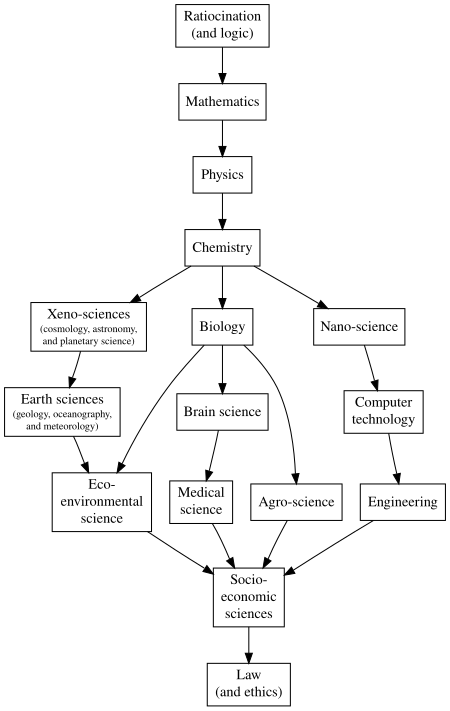Outline of physical science: Difference between revisions
No edit summary |
|||
| Line 128: | Line 128: | ||
[[Category:Physical sciences]] |
[[Category:Physical sciences]] |
||
[[Category:Scientific terminology]] |
[[Category:Scientific terminology]] |
||
yut |
|||
Revision as of 09:07, 6 June 2013
| Part of a series on |
| Science |
|---|
| This is a subseries on philosophy. In order to explore related topics, please visit navigation. |
Physical science is the study of physics and chemistry of nature. [citation needed] From the materialist and functionalist viewpoints it overlaps the life sciences where ecology studies the evidences of historical facts or evolution. Natural sciences bridge the phenomena in the physical sciences to the noumenon in the life sciences. The following is presented as an overview and topical guide of these physical sciences.
General principles of the physical sciences
The foundations of the physical sciences rests upon key concepts and theories, each of which explains and/or models a particular aspect of the behavior of nature.
Basic principles of physics
Physics alongwith Mathematics and Chemistry is one of the "fundamental sciences" because the other natural sciences like biology, geology etc., deal with systems that seem to obey the laws of physics. According to Physics the physical laws of matter, energy and the fundamental forces of nature govern the interactions between particles and physical entities (such as planets,molecules,atoms or the subatomic particles). Some of the basic pursuits of physics are:
- Describing the nature, measuring and quantifying of bodies and their Motion, dynamics etc.,
The following are some of the most prominent developments in modern science in the last millenium.
- Newton's laws of motion
- mass, force and weight
- Momentum and conservation of energy
- gravity,theories of gravity
- Energy, work, and their relationship
- Motion, position, and energy
- different forms of Energy,their interconversion and the inevitable loss of energy inthe form of heat (Thermodynamics)
- Energy conservation, conversion, and transfer.
- Energy source the transfer of energy from one source, to work in another.
- Kinetic molecular theory
- Phases of matter and phase transitions
- Temperature and thermometers
- Energy and heat
- Heat flow: conduction, convection, and radiation
- The three laws of thermodynamics
- The principles of waves and sound
- The principles of electricity, magnetism, and electromagnetism
- The principles, sources, and properties of light
Basic principles of astronomy
Astronomy is the science of celestial bodies and their interactions in space. Its studies includes the following:
- The life and characteristics of stars and galaxies
- Origins of the universe. Physical science uses the Big Bang theory as the commonly accepted scientific theory of the origin of the universe
- A heliocentric Solar System. Ancient cultures saw the Earth as the centre of the Solar System or universe (geocentrism). In the 16th century, Nicolaus Copernicus advanced the ideas of heliocentrism, recognizing the Sun as the centre of the Solar System.
- The structure of solar systems, planets, comets, asteroids, and meteors
- The shape and structure of Earth (roughly spherical, see also Spherical Earth)
- Earth in the Solar System
- Time measurement
- The composition and features of the Moon
- Interactions of the Earth and Moon
(Note: Astronomy should not be confused with astrology, which assumes that people's destiny and human affairs in general are correlated to the apparent positions of astronomical objects in the sky -- although the two fields share a common origin, they are quite different; astronomers embrace the scientific method, while astrologers do not.)
Basic principles of chemistry
Chemistry, built upon concepts from physics, addresses phenomena associated with the structure, composition and energetics of matter as well as the changes it undergoes. Often known as the central science, chemistry connects the fundamental laws of physics to engineering and other natural sciences such as biology, earth science, astronomy and material science

- Physical chemistry
- Theoretical chemistry
- Computational chemistry
- Nuclear chemistry
- The nature of the atomic nucleus
- Characterization of radioactive decay
- Nuclear reactions
- Organic chemistry
- Inorganic chemistry
- Biochemistry
- Analytical chemistry
- Electrochemistry
- Materials chemistry
Basic principles of earth science
Earth science is the science of the planet Earth, the only identified life-bearing planet. Its studies include the following:
- The water cycle and the process of transpiration
- Freshwater]
- Weathering and erosion
- Rocks
- Agrophysics
- Soil science
- Earth's tectonic structure
- Geomorphology and geophysics
- Physical geography
- Seismology: stress, strain, and earthquakes
- Characteristics of mountains and volcanoes
- Characteristics and formation of fossils
- Atmosphere of Earth
- Atmospheric pressure and winds
- Evaporation, condensation, and humidity
- Fog and clouds
- Meteorology, weather, climatology, and climate
- Hydrology, clouds and precipitation
- Air masses and weather fronts
- Major storms: thunderstorms, tornadoes, and hurricanes
- Major climate groups
- Speleology
Notable physical scientists
External links
yut
